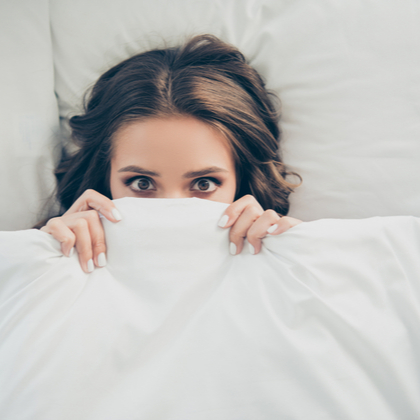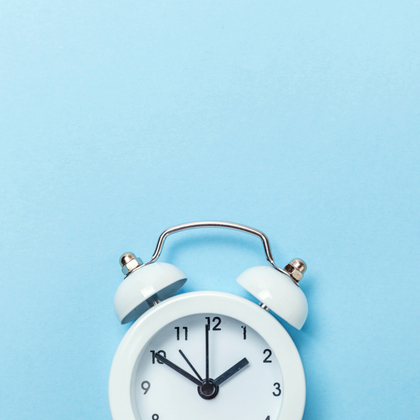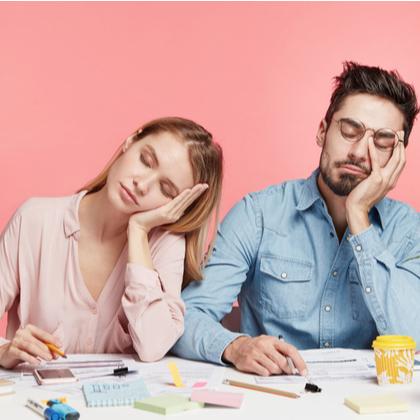
If you feel exhausted during the week and repeatedly hit the snooze button at the weekends, you could be experiencing a common modern phenomenon called social jetlag.
As with normal jetlag, social jetlag forces the body to move between time zones – one determined by our internal body clock or circadian rhythm, the other by work and social commitments.
Social jetlag does more than make you feel tired and groggy on a Monday morning; it can affect your health on every level.
Here, we look at what causes social jetlag and how to prevent it.
What is social jetlag?
The circadian rhythm is our body’s intrinsic 24-hour clock, which regulates our sleep-wake cycle. However, because of our modern lifestyle, our social clock doesn’t always align with our circadian clock, resulting in a phenomenon known as 'social jetlag'.
‘Social jetlag’ describes a shift in circadian rhythm, where sleeping patterns vary between workdays, weekends, and holidays. Put simply, it’s the disconnect between social and biological times.
But social jetlag isn’t just caused by work obligations, late-night socialising, and sleeping in on a Sunday. Shift work can also be a contributing factor, as can a mismatch between chronotype (genetic predisposition for sleep and wakefulness) and weekday schedule.
How do chronotypes influence social jetlag?
Largely dictated by genes, chronotypes are inherent preferences for wakefulness and sleep. When your biological chronotype is incompatible with the fixed social rhythms of life, it can result in social jetlag.
People with later chronotypes – so-called ‘Wolves’ and ‘Dolphins’ who wake and sleep later on work-free days than workdays – tend to struggle with social jetlag the most and consistently feel tired as they need to wake up early for work or school.
Similarly, those with early chronotypes, also known as ‘Lions,’ may experience sleep loss if pressured into staying up late weekends.
Social jetlag symptoms
If you’re struggling with social jetlag, you may notice the following symptoms:
-
Morning grogginess (sleep inertia)
-
Increased daytime fatigue (or feeling ‘jetlagged’)
-
Difficulty concentrating
-
Low mood and irritability
How can social jetlag affect health?
Just as we have a circadian rhythm, each of our cells has a molecular clock, which controls every physiological process in the body, including immune function, mood, hormones, and body temperature. Social jetlag can disrupt this delicate biological system and throw our health out of whack.
A study by the University of Arizona College of Medicine found that every hour of social jetlag increased the likelihood of developing cardiovascular disease by 11 per cent, highlighting the potential impact on physical health (1).
Find out more about cardiovascular health here.
Research also suggests social jetlag can significantly impact cognitive function and mental health. A study on adolescents found those who experienced social jetlag were more likely to struggle with their emotional wellbeing and academic performance (2).
Find out more about mental health & wellbeing here.
Scientists believe social jetlag can negatively influence the gut, too, which plays a crucial role in our overall health. Recent research conducted by nutritionists and medical experts at King’s College London on 1,000 participants discovered that even a 90-minute variation in the midpoint of sleep over a week might cause a less favourable mix of bacteria in the gut (3).
Find out more about gut health here.
This study also revealed that people with social jetlag often made poorer dietary choices, eating fewer plant-based foods, such as fruit and nuts, and consuming more highly refined foods, like sugary beverages and crisps, which may lead to weight gain.
Find out more about healthy eating here.
How can we prevent social jetlag?
When it comes to social jetlag, prevention is better than cure. Simple changes to your lifestyle and sleep hygiene can help you avoid social jetlag and racking up sleep debt.
Maintain a regular sleep pattern
The odd lie-in isn’t going to hurt. In fact, catching up on sleep at the weekend can help you feel refreshed if you’ve accrued any sleep debt throughout the week. However, it’s important to note that a longer weekend snooze can’t clear your sleep debt completely.
A better alternative is maintaining a regular sleep-wake pattern during the week. This means going to bed and waking up at the same time every day. You can make it easier to stick to a healthy sleep routine by avoiding caffeine after midday enjoying a relaxing wind-down routine, and disconnecting from screens in the evening.
If you have a hard time resisting a lie-in at the weekend, that’s okay. Just consider limiting it to within an hour of your usual wake time so it won’t disrupt your circadian rhythm too much.
Take a nap
Napping can also be a helpful tool to reduce social jetlag. Not only can microsleeps counteract daytime drowsiness and fatigue, but studies suggest they can improve workplace performance and productivity (4). Napping is also great for shift workers, who often struggle with social jetlag.
We recommend sticking to a 20–30-minute nap between traditional siesta hours – 12 pm and 2 pm – which should provide enough restoration without entering deep sleep and disrupting rest at night.
For a longer-lasting energy boost, you could take a full 90-minute sleep cycle to enter nourishing REM sleep. Just ensure you don’t nap for this long too late in the day since it could interrupt your sleep at night.
Use light properly
Light is one of the best ways to synchronise the circadian rhythm and reduce the effects of social jetlag. When we flood our eyes with morning light, we advance our body clock, meaning we feel sleepier earlier in the evening. However, exposure to evening and night light delays our body clock, making us want to go to bed later.
Research suggests those with later chronotypes tend to encounter more evening light, which can delay their circadian clock, increase their inclination to stay up late, and cause social jetlag (5).
To prevent this from happening, consider switching off overhead lights two hours before bed and switching to soft lamps. Additionally, removing technology from your bedroom or using night mode on devices can also help to block some blue light in the evening.
Equally, try to soak up natural light as soon as you wake up. The Journal of Sleep Medicine reported that 15 minutes of bright morning light can help you fall asleep earlier that same night (6).
Follow healthy sleep hygiene every day
Practising good sleep hygiene will provide a buffer to social jetlag. Following healthy sleep habits throughout the week will make it easier to avoid sleeping in at the weekend and disrupting your circadian rhythm.
You can read more about supporting your sleep hygiene here.
Work with your chronotype
Unfortunately, you can’t change your chronotype. It's determined by genetics. So, the only thing to do is adapt to it instead of resisting it.
If you’re a true night owl, traditional 9-5 working schedules can make it challenging to get enough sleep. Therefore, it might be worth discussing the possibility of flexible working with your employer. Many workplaces are now open to the idea, so you could find some wriggle room to accommodate your later chronotype.
Think about your nutrition
Your nutrition is important, too. Ensuring a plentiful intake of the following nutrients can help set you up for sleep success.
B vitamins
Many B vitamins support normal psychological function, including vitamins B1 and B12, and nervous system function – namely, vitamins B2, B3, B6, and B7 – all of which are essential for sleep.
Although you can find these B vitamins in fish, poultry, meat, eggs, green leafy vegetables, beans, and peas, you may want to take a comprehensive B complex to cover any nutritional shortfalls.
Magnesium
Involved in over 300 biochemical processes, magnesium contributes to normal psychological and nervous system function, which is why it’s often recommended for sleep.
You can find magnesium in whole grains, dark chocolate, nuts, and seeds. Still, you may wish to take a high-strength supplement to cover any nutritional shortfalls.
PEA
PEA is an endocannabinoid-like compound naturally produced when cells are damaged or threatened. It's a well-researched alternative to CBD and is often recommended to support sleep.
Griffonia seed extract
Griffonia seed extract contains 5 HTP (5-Hydroxytryptophan), the natural compound produced from the amino acid tryptophan. The brain converts 5 HTP into serotonin, the ‘feel-good’ neurotransmitter that influences sleep.
Theanine and lemon balm (melissa)
An amino acid found in green and black tea, l-theanine is best known for its calming and soothing qualities. It’s often taken with lemon balm (melissa) to support rest and relaxation.
You can read more about how theanine and lemon balm can support sleep hygiene here.
Tart (or sour) cherry juice
Packed with powerful antioxidants called anthocyanidins, tart cherry juice is a popular choice for sleep.
We recommend combining tart (or sour) cherry juice with magnesium powder for a delicious-tasting, sleep-enhancing mocktail. You can read more here.
Valerian
Valerian root is a traditional herb used for the temporary relief of sleep disturbances and mild anxiety.
Find out more
If you found this piece on social jetlag and sleep useful, you can find similar guidance on our dedicated Sleep Health Hub. Alternatively, please get in touch with our team of expert Nutrition Advisors, who are on hand to provide free, confidential advice via email, phone, and Live Chat.*
*Subject to cookie consent
References:
-
Medical News Today. (2017) "Going to bed later on weekends may harm your health." Available at: https://www.medicalnewstoday.com/articles/317780#One-hour-of-social-jet-lag-raises-heart-disease-risk-by-over-11-percent.
-
Lin WH, Yi CC. (2015) "Unhealthy sleep practices, conduct problems, and daytime functioning during adolescence." J Youth Adolesc. 44(2):431-446.
-
Bermingham KM, Stensrud S, Asnicar F, et al. (2023) "Exploring the relationship between social jetlag with gut microbial composition, diet and cardiometabolic health, in the ZOE PREDICT 1 cohort." Eur J Nutr. 62:3135-3147.
-
Somers M. (2020) "Research proves it: Naps save you money." MIT Sloan. Available at: https://mitsloan.mit.edu/ideas-made-to-matter/research-proves-it-naps-save-you-money.
-
Porcheret K, Wald L, Fritschi L, Gerkema M, Gordijn M, Merrow M, Rajaratnam SMW, Rock D, Sletten TL, Warman G, Wulff K, Roenneberg T, Foster RG. (2018) "Chronotype and environmental light exposure in a student population." Chronobiol Int. 35(10):1365-1374.
-
Crowley SJ, Eastman CI. (2015) "Phase advancing human circadian rhythms with morning bright light, afternoon melatonin, and gradually shifted sleep: can we reduce morning bright-light duration?" Sleep Med. 16(2):288-297.
Related Posts

Do I Have Symptoms Of Insomnia Or Just Trouble Sleeping?

Insomnia Treatments: Natural Remedies To Help You Fall Asleep

Why Am I Always Tired? Signs Of Poor Sleep Hygiene Explained

Olivia
Olivia Salter has always been an avid health nut. After graduating from the University of Bristol, she began working for a nutritional consultancy where she discovered her passion for all things wellness-related. There, she executed much of the company’s content marketing strategy and found her niche in health writing, publishing articles in Women’s Health, Mind Body Green, Thrive and Psychologies.
View More
